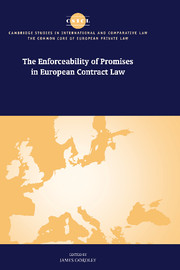Book contents
- Frontmatter
- Contents
- General editors' preface
- List of contributors
- Table of legislation
- List of abbreviations
- 1 Some perennial problems
- 2 Contemporary solutions
- Case 1 promises of gifts
- Case 2 promises of compensation for services rendered without charge
- Case 3 promises to pay debts not legally due
- Case 4 a promise to come to dinner
- Case 5 promises to store goods without charge
- Case 6 promises to do a favour
- Case 7 promises to loan goods without charge
- Case 8 a requirements contract
- Case 9 promises to pay more than was agreed I
- Case 10 promises to pay more than was agreed II
- Case 11 promises to do more than was agreed; promises to waive a condition
- Case 12 promises to take less than was agreed
- Case 13 options given without charge
- Case 14 promises of rewards
- Case 15 promises of commissions
- 3 Comparisons
- Index by country
- Index by subject
Case 11 - promises to do more than was agreed; promises to waive a condition
Published online by Cambridge University Press: 18 May 2010
- Frontmatter
- Contents
- General editors' preface
- List of contributors
- Table of legislation
- List of abbreviations
- 1 Some perennial problems
- 2 Contemporary solutions
- Case 1 promises of gifts
- Case 2 promises of compensation for services rendered without charge
- Case 3 promises to pay debts not legally due
- Case 4 a promise to come to dinner
- Case 5 promises to store goods without charge
- Case 6 promises to do a favour
- Case 7 promises to loan goods without charge
- Case 8 a requirements contract
- Case 9 promises to pay more than was agreed I
- Case 10 promises to pay more than was agreed II
- Case 11 promises to do more than was agreed; promises to waive a condition
- Case 12 promises to take less than was agreed
- Case 13 options given without charge
- Case 14 promises of rewards
- Case 15 promises of commissions
- 3 Comparisons
- Index by country
- Index by subject
Summary
Case
Contractor, a construction company, agreed to build an office building for Realty, a real estate company. According to their agreement, Contractor was to receive a fixed amount ‘which shall be due after an architect appointed by Realty certifies that the building is finished according to the specifications’ contained in the contract. While the building was under construction, Contractor promised, without demanding or being offered additional payment, to install more expensive glareproof windows than the specifications called for. Some time later, Realty promised that Contractor would be paid without seeking an architect's certificate. Are either of these promises binding? Would it matter if Realty had already advertised the glareproof windows, or Contractor had already covered over portions of the building the architect would have needed to inspect, before the other party threatened not to keep its promise?
Discussions
FRANCE
Once a contract exists, as a general principle under art. 1134 of the Civil Code, it cannot be modified unilaterally. However, French law recognizes that a party can agree to modify the contract in his sole interest, provided that the conditions for the formation of a contract are satisfied. Whether they are is a question of fact which is within the absolute authority of the trial courts. In our view, the oral promises here would be enforceable.
THE ENFORCEABILITY OF PROMISES
They may be considered to be unilateral offers to modify the contract. They must be accepted, and, as a general rule, silence does not amount to acceptance.
- Type
- Chapter
- Information
- The Enforceability of Promises in European Contract Law , pp. 255 - 266Publisher: Cambridge University PressPrint publication year: 2001



